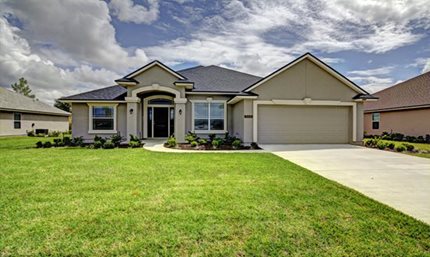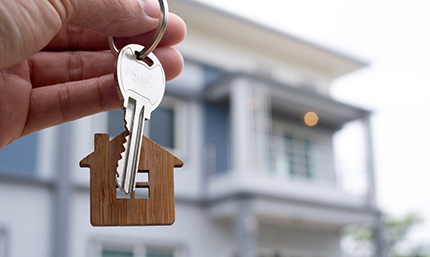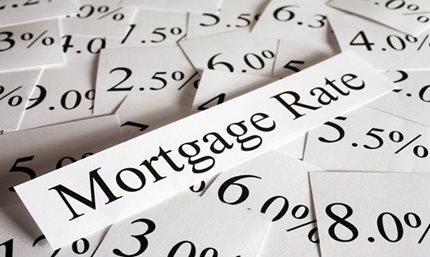News & Tips
The Full List of Florida FHA Loan Requirements: Important FHA Guidelines for Borrowers

FHA loans offer a more accessible avenue to homeownership for many people thanks to its low down payment and credit score requirements. Not sure if you meet the qualifications, or if it’s a good fit for you? No worries, you’re in the right place with this article. Welcome to FHA Loans 101, where we’ll cover Florida FHA loan requirements and frequently asked questions to help you decide if it’s for you. We’ll also talk more about FHA loan closing costs and helpful tips to keep in mind when completing your application and negotiating your home’s price.
Learn more about FHA loans at Space Coast Credit Union.
What is an FHA loan?
An FHA loan is a type of loan that’s insured by the Federal Housing Administration and issued by an FHA-approved lender (not the FHA itself) in the United States and its territories. Borrowers who meet a certain credit score can qualify for an FHA loan with a lower down payment than conventional loans. For that reason, this type of home loan is a popular option among first-time homebuyers; however, FHA loans are available to buyers of all kinds. Homebuyers who have undergone bankruptcy or foreclosures may be able to qualify for an FHA loan as well (but additional conditions may apply). FHA loan lending limits also vary by location and housing type.
Florida FHA Loan Lending Limits
What is the maximum FHA loan lending amount for 2026? The lending limits for FHA loans vary by state, housing type (single, duplex, tri-plex, four-plex), and local housing costs. The FHA loan lending limit for 51 Florida counties is $541,287 for a single home. Monroe County holds the trophy for the highest lending amount for a single home at $1,249,125. You can see more Florida FHA loan lending limits here.
What are the FHA loan property requirements?
Be sure that the property you plan to purchase meets FHA loan requirements before applying too. The property can be for a single-family home (detached, condo, townhouse), a multi-family home with up to four units (as long as you live in one of them), or a manufactured home on a permanent foundation. It cannot be for an investment property or a house flip. The property must be for a primary residence (where you live the majority of the time), and at least one borrower must occupy the property within 60 days of closing. The borrower must also take title to the property in their own name or in the name of a living trust at settlement.
FHA Credit Score Requirement
Before we get to the credit score requirement for an FHA loan, it’s important to first discuss FICO® scores. A FICO score is a three-digit number based on an individual’s credit report, and it help lenders determine a homebuyer’s creditworthiness. However, it’s important to note that different versions of the FICO score exist based on different scoring models.
A FICO score also helps lenders determine how likely you’ll pay back your mortgage payments on time. FICO calculates a score using percentage weights based on your payment history (35%), amounts owed on loans (30%), credit history length (15%), new credit accounts (10%), and credit types used (10%). Typically, the better your FICO credit score, the better your home loan’s interest rate.
FICO’s scoring ranges:
- Exceptional: 800-850
- Very good: 740-799
- Good: 670-739
- Fair: 580-699
- Poor: 300-579
To qualify for an FHA loan, you need a minimum credit score of 600, which is much lower than for conventional home loans, but it comes with a higher down payment requirement. You can learn more about the difference between an FHA loan and conventional loans here.
| Term | Rate "As Low As" | APR* "As Low As" | Example Loan Amount | Example Monthly Payment |
|---|---|---|---|---|
| 15 Years | 5.125% | 5.266% | $300,000 | $2,391.96 |
| 30 Years | 5.875% | 5.960% | $300,000 | $1,774.61 |
Example monthly payments do not include taxes and insurance, and the actual payment obligation will be greater.
HOME LOANS: Rates based on creditworthiness. Mortgage loans are originated by Space Coast Credit Union and are subject to credit approval, verification, and collateral evaluation. Programs, offers, rates, terms, and conditions are subject to change or cancellation without notice. Certain restrictions apply. Taxes and insurance not included; your actual payment obligation will be higher.
These mortgage loan programs constitute first mortgage liens secured by the home and property. Your down payment is determined by the Loan-to-Value ratio. (90% LTV = 10% down payment). Loans exceeding 80% of the appraised value of the home require private mortgage insurance. Member responsible for any funds needed for closing costs and pre-paid escrow.
FHA Down Payment Requirement
The minimum down payment for an FHA loan is generally tied to your credit score. If you’d like to only put down 3.5%16 , you’ll need a minimum credit score of 580. For borrowers with credit scores from 500 to 579, they’ll need to put down 10% of the home’s purchase price.
Florida FHA Loan Lending Limits
What is the maximum FHA loan lending amount for 2026? The lending limits for FHA loans vary by state, housing type (single, duplex, tri-plex, four-plex), and local housing costs. The FHA loan lending limit for 51 Florida counties is $541,287 for a single home. Monroe County holds the trophy for the highest lending amount for a single home at $1,249,125. You can see more Florida FHA loan lending limits here.
FHA Debt-to-Income Ratio Guideline
FHA lenders consider two different ratios before issuing a loan. The first is the Payment-to-Income Ratio (PTI), or front-end debt ratio, which compares your proposed monthly mortgage payments to your monthly income.
The second ratio is Debt-to-Income (DTI), which calculates how much of your gross monthly income goes toward debt payments (rent, current mortgage, credit cards, loans, etc.).
Instead of guessing, use our interactive calculator below to estimate your DTI before applying. PTI depends on your proposed mortgage payment.
Calculate Your DTI Ratio
Enter your monthly pre-tax income and debt payments.
FHA guidelines often look for a DTI at or below 50% and a PTI around 40%, though limits may vary by lender and borrower profile. Knowing these numbers ahead of time can help you prepare a stronger application.
FHA Loan Income Requirements
Borrowers don’t need to meet a minimum monthly income requirement to qualify for an FHA loan, and there’s no maximum salary that will disqualify them either. However, you will need to show that you have a sufficient, steady income, which assures lenders that you can afford the loan.
FHA Mortgage Insurance Requirement
With an FHA loan, you’ll be required to pay an upfront mortgage insurance premium (UFMIP) and an annual mortgage insurance premium (AMIP). These charges reduce loss for lenders if the borrower defaults on the loan. You can pay the UFMIP all at once in cash at closing time, or you can have it financed into the loan amount. The UFMIP is a one-time payment that is 1.75% of the base loan amount, and it’s non-refundable.
Your AMIP amount is calculated annually, but borrowers pay it monthly on top of the loan payment. The AMIP amount varies based on the FHA loan term, loan amount, and your current loan-to-value (LTV) ratio. If you put down less than 10% for your FHA loan, you’ll need to pay the AMIP for the life of the loan (unless you convert the FHA loan into a conventional loan). If you put down 10% or more, you’ll only need to pay the AMIP for 11 years.
FHA Closing Costs
When financing an FHA home loan, it’s important to budget for closing costs and fees, which are the expenses you pay to complete a real estate transaction. These cost amounts will vary by state, lender, and vendors. Some closing costs are specific only to FHA loans. In Florida, the average closing cost fee is between 2.05% and 2.75% of the total purchase price.
Here’s a checklist of common closing costs:
- Lender’s origination fee: This is usually 0.5% to 1% of the loan amount that lenders sometimes charge as compensation for loan processing and other fees.
- Underwriting fee: Many lenders, but not all, will charge an underwriting fee to cover the cost of evaluating the loan application. This may be in lieu of or in addition to an origination fee. The average cost is between $400 and $900.
- Document preparation fee: This fee is usually around $50-$100 and covers the cost for managing loan paperwork and documents.
- Appraisal fee: This is what you pay for the appraiser to estimate a home’s market value. It’s typically between $300 and $500. The lender will require an FHA-approved professional appraiser.
- Home inspection: The FHA does not require a home inspection, but it’s important for buyers to get one to identify the home’s problems (and if it’s worth buying). The typical cost of a home inspection is around $300. You may also need a separate inspection for a septic tank if your home has one.
- Homeowner's insurance: This amount will vary based on the home and location (from $800 to $2,500 a year), but with most FHA loans, you’ll need to pay this in advance before closing.
- Property survey: This will identify the property’s boundaries, any new structures or additions too close to a property line, and any neighboring items that encroach on the property (about $500). You can also see if the home has an existing property survey at your town hall (which may work if the home hasn’t had any property changes since then).
- Title search and insurance fees: These are often quite the lion’s share of closing costs, as they’re often between $1,000 to $1,200 to cover the cost of having a title company do research on any liens against the property, and along with title insurance, this protects you against any lien claims or future deeds against your property.
- FHA Upfront Mortgage Insurance Premium (UPMIP): As previously mentioned, this is 1.75% of the loan amount.
Other possible closing costs: credit report fee, application fee, discount fee, attorney fee, tax service fee, recording fee, wire transfer fee, pre-paid property tax, tax escrows, notary fee, courier fee, and flood certification fee.
Helpful Tip: Be sure to ask the lender if they can waive or lower any of these fees. You can also try to negotiate with the seller to pay for some of them (or a percentage of them), use a gift of cash from a friend or family member, or roll some of the costs into your loan.
FHA Required Documents
You’ll also need the following to apply for an FHA loan:
- Minimum of two established credit accounts (for example, loans or credit cards) and not have any delinquent federal debt, judgements, or past FHA insured mortgage debts
- Valid government-issued ID, such as a driver’s license or passport
- Proof of a Social Security number
- Up to two years’ worth of original pay stubs, W-2 forms, or valid tax returns
See our Home Buying Center for more helpful checklists and worksheets. There you can also learn more about what you need before applying for an FHA loan.
How to Apply for an FHA Loan | Space Coast Credit Union
Feel free to get in touch with us to review your specific home loan needs and discuss your options. You’re also welcome to request more info here. At SCCU, we offer FHA loans with terms up to 30 years and competitive interest rates. Plus, we don’t charge any application fees. You can easily apply for an FHA loan online or at a branch.
































